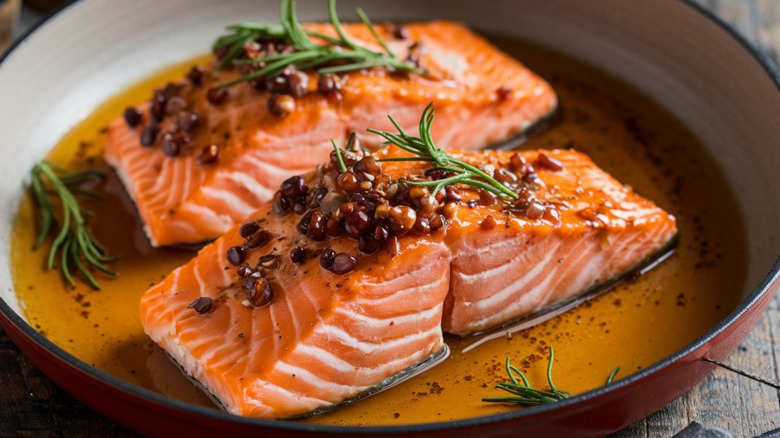A Nutritious Protein High In Omega Fats Can Also Improve Your Sleep
If you struggle to get a good night's sleep, you're not alone. Millions of people toss and turn each night, turning to supplements, meditation, or a hot bath to help them fall asleep faster and stay asleep. While sleep hygiene and other sleep-promoting behaviors often help, your diet may play a role in your sleep.
Although fatty fish like salmon is known for its heart-healthy omega-3 fatty acids, it may also help the quality of your sleep. In a 2014 article in the Journal of Clinical Sleep Medicine, men who ate Atlantic salmon three times a week fell asleep more quickly and reported being able to function better the next day compared to a control group. The salmon-eating group also improved their heart rate variability (HRV), which is the variation between heartbeats that indicates how well the body adapts to stress. A higher HRV was linked to falling asleep faster and improved daily functioning.
Registered dietitian Angel Luk says there must be something in salmon that may be good for your sleep. "However, whether this improvement is due to its vitamin D, omega-3, or other nutrient content, is still to be determined," she said.
The effect of salmon's nutrients on sleep
A 6-ounce filet of cooked Atlantic salmon has 43 grams of protein and almost 14 grams of fat (just 2 saturated grams). You'll find almost 4 grams of omega-3s, which is more than twice the daily recommendation. Looking a little more closely among those omega-3s, there are 2.4 grams of docosahexaenoic acid (DHA) and 699 milligrams of eicosapentaenoic acid (EPA). A 2021 study in Nutrients had people take DHA-rich oil, EPA-rich oil, or a placebo to see the effect on sleep. Although the people taking the DHA-rich oil had better sleep efficiency and took less time to fall asleep, they said they felt more sluggish the next day compared to the EPA group. A 2024 review in the Journal of Clinical Biochemistry and Nutrition analyzed the results of eight studies and found that omega-3s may improve sleep quality.
Atlantic salmon is also a good source of vitamin D, providing 22 micrograms per 6-ounce filet. Most adults need 15 micrograms of vitamin D daily to protect the bones, support the immune system, and carry messages through the nervous system. Vitamin D may also help you sleep. A 2022 review in Nutrition and Health pooled the results of five studies to find that supplementing with vitamin D may improve sleep quality. On the other hand, nine studies reviewed in a 2018 article in Nutrients found that a vitamin D deficiency not only increases your risk of a sleep disorder by 50% but is also linked to a significantly higher risk of poor sleep quality, shorter sleep time, and sleepiness.
Other health benefits of salmon
You may want to add some salmon to your plate for other health benefits. Those omega-3s that may help you sleep may also protect you as you age. Omega-3s can reduce inflammation, protect your brain, and preserve your muscles and bones. Omega-3s also work with the antioxidant astaxanthin to keep your skin's elasticity. Including more fish in your diet may also protect you against health conditions such as cancer, asthma, and rheumatoid arthritis. If you're worried about possible mercury poisoning from eating salmon, the Food and Drug Administration actually lists salmon as one of the best options because it has lower mercury levels.
Salmon can be enjoyed in many ways, but Luk has her preferences to maintain their nutrients. "One of my favorite ways to prepare salmon is to lightly bread them in seasoned panko and air fry them to have a higher omega-3 option for the classic fish and chips dinner at home," she said. "This method uses no additional cooking oil except to coat the air fryer basket to prevent sticking." If you don't have an air fryer, Luk suggests wrapping the salmon, along with seasonings and vegetables, in parchment paper and baking it in the oven.



